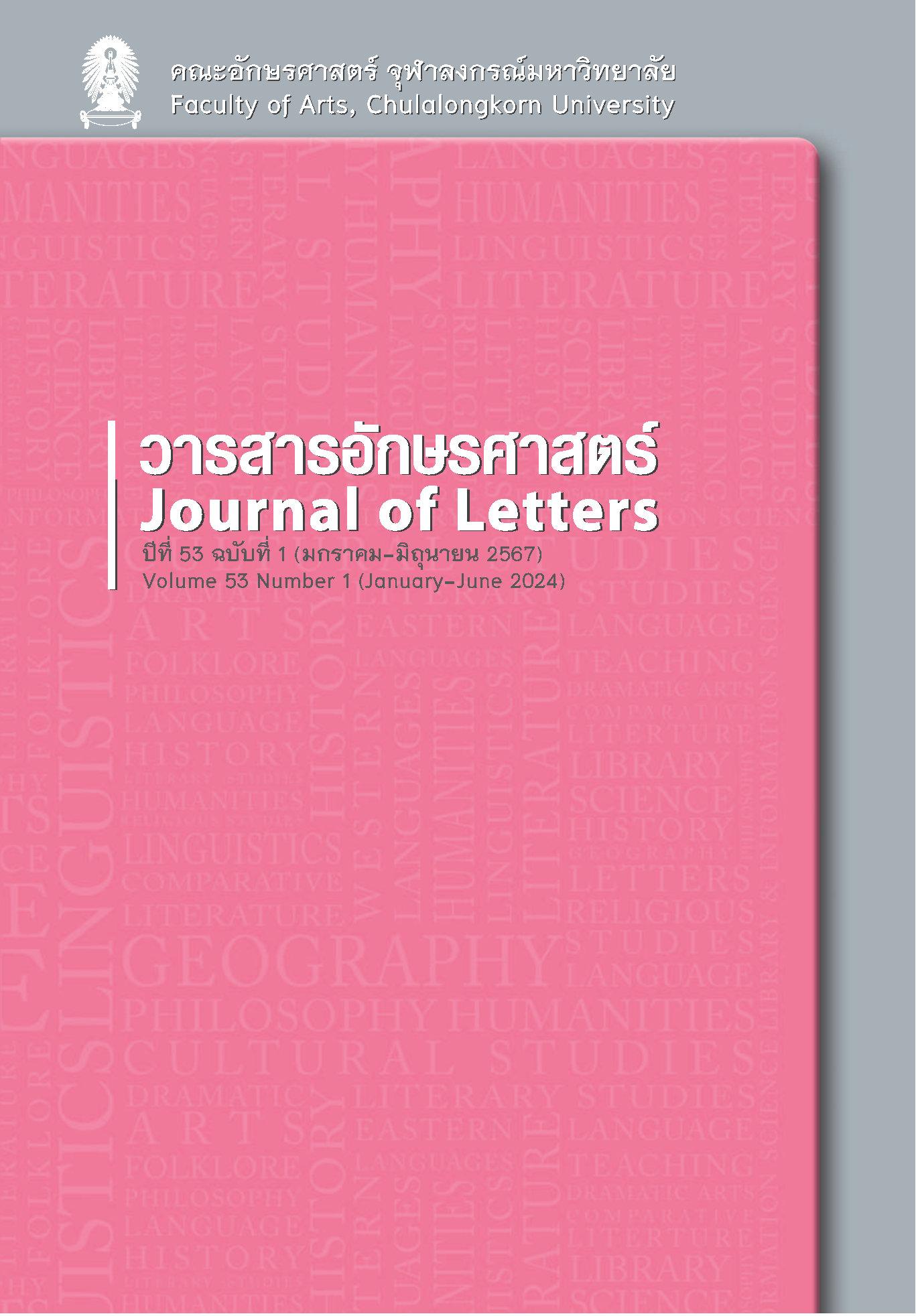A Study of Representations of South Korean Women under the ConfucianTradition during the Period of Democratic and Economic Development from Korean Series Reply 1988
Keywords:
South Korean Women, Confucianism, Reply 1988, Korean Drama series, democratic and economic developmentAbstract
One of the nations where Confucian traditions have had a long-standing influence on women is South Korea and still adheres to these practices until present. The purpose of this research is to study the representation of South Korean women under the Confucian tradition during the period of democratic and economic development from Korean Series Reply 1988 (응답하라 1988). This study used a combination of qualitative research methods and quantitative research methods. By extract, the framework for women according to the Confucian tradition comes from content analysis of literature review, which are four factors; 1) morality 2) to speak politely and appropriately 3) appropriate etiquette appearance and 4) to have skills in own's work, to analyze women from three roles which are; 1) role of a daughter 2) role of wife and 3) roles of mother by record in coding sheet. The results found that five characters are reflecting the image of South Korean women according to the framework of women in the Confucian tradition during the period of democratic and economic development. In addition, representations of women that reflect the characteristics of women who fail to be align with the Confucian tradition were also found from two characters, that can be highlighted. One of the characters in the role of daughter did not have the gentle spoken characteristic and participate in politics activities. Another character, the role of mother, appears that she can have different opinions from her husband and has a role as a leader in the family. The result is consistent with Inglehart's theory that economic and social development affects cultural change in that society. The two-characters failures of the Confucian tradition had financially independent. Therefore, if society wishes to escape from patriarchal society, accelerating economic and social development are the factors that should be considered.
References
ภาษาไทย
Boonwat Sawangwong บุญวัฒน์ สว่างวงศ์. (2016). Patthanakan thang kanmueang lae senthang su prachathipatai khong Thai lae Kaolitai พัฒนาการทางการเมืองและเส้นทางสู่ประชาธิปไตยของไทยและเกาหลีใต้ [Political development and the road to democracy between Thailand and South Korea]. Warasarn sahawitthaya karn wichai: chabab bandit sueksa วารสารสหวิทยาการวิจัย: ฉบับบัณฑิตศึกษา [Journal of Interdisciplinary Research: Graduate Studies], 5(1), 62-74.
Chanarat Yimchang ชนารัตน์ ยิ้มแฉ่ง. (2014). Kan suesan kham watthanatham phan series Kaoli การสื่อสารข้ามวัฒนธรรมผ่านซีรีส์เกาหลี [Cross-cultural communication through Korean drama series] [Unpublished master’s thesis]. Kasetsart University.
Damrong Thandee ดำรงค์ ฐานดี. (2007). Puying nai sangkom Kaoli ผู้หญิงในสังคมเกาหลี [Women in Korean society]. Warasarn Senathipat วารสารเสนาธิปัตย์ [Senathipat Journal], 56(1), 122-132.
Eun, Ki Soo อึน, คี ซู. (2016). Kha niyom khong chao Kaolitai ค่านิยมของชาวเกาหลีใต้ [South Korean values] (Pannapa Song, Trans.). Chulalongkorn University Press.
Ranwarat Poonsri, Paphonphat Kobsirithiwara, Pisit Amnuayngerntra & Lalida Wissanuwong รัญวรัช์ พูลศรี, ปพนพัชร์ กอบศิริธีร์วรา, พิสิฐ อำนวยเงินตรา และลลิดา วิษณุวงศ์. (2020). Khongchue niyom lae ittiphon tor satri nai Kaoli lae Vietnam ขงจื๊อนิยมและอิทธิพลต่อสตรีในเกาหลีและเวียดนาม [Confucianism and influence on Korean and Vietnamese women]. Warasarn Chin sueksa วารสารจีนศึกษา [Chinese Studies Journal], 13(2), 397-420.
Wichian Intasi วิเชียร อินทะสี. (2013). Phollawat kwam pen prachathipatai nai Kaolitai chak amnat niyom su prachathipatai thi mankong พลวัตความเป็นประชาธิปไตยในเกาหลีใต้ จากอำนาจนิยมสู่ประชาธิปไตยที่มั่นคง [Democratic dynamics in South Korea from authorianism to stable democracy]. Chulalongkorn University Press.
Wilasinee Pananakhonsab วิลาสินี พนานครทรัพย์. (2017). Pollawat khong khrobkhrua lae botbat phuying Kaoli nai sangkhom Kaolitai พลวัตของครอบครัวและบทบาทผู้หญิงเกาหลีในสังคมเกาหลีใต้ [Family dynamics and the role of Korean women in South Korean society]. In Noppadol Chartprasert (Ed.), Kaoli Patchuban เกาหลีปัจจุบัน [Korea Today] (pp. 299-341). Institute of East Asian Studies, under the patronage of Her Royal Highness Princess Maha Chakri Sirindhorn, Thammasat University.
ภาษาต่างประเทศ
Du, Fangqin. (2022). Three obediences, four virtues, and seven criteria code of divorce. Academy of Chinese Studies. Retrieved August 30, 2023, from https://chiculture.org.hk/index.php/en/china-five-thousand-years/3190
The Economist Group. (2023). Democracy Index 2022. The Economist Intelligence Unit. Retrieved August 30, 2023, from https://www.eiu.com/n/campaigns/democracy-index-2022/
Han, H.-S. (2004). Women’s life during the Choson Dynasty. International Journal of Korean
History, 6(1), 113-160.
Park, I. H., & Cho, L.-J. (1995). Confucianism and the Korean family. Journal of Comparative Family Studies, 26(1), 117-134.
Koop, A., & Ma, J. (2023). Mapped: The state of democracy around the world. Visual capitalist. Retrieved August 30, 2023, from https://www.visualcapitalist.com/state-of-democracy-around-the-world-2023/
Downloads
Published
How to Cite
Issue
Section
License

This work is licensed under a Creative Commons Attribution-NonCommercial-NoDerivatives 4.0 International License.
Copyright and plagiarism
Authors are responsible for obtaining permission to use copyrighted materials from copyright owners. Authors are responsible for observing requisite copyright law when quoting or reproducing copyrighted materials. Quotations and reproductions of content from other published sources must be accompanied by a reference and all sources should be clearly listed in the references section. Quotations and reproductions of content from external sources without due attribution could be considered a severe infringement of academic conduct and may constitute a legal offence under the Copyright Act of B.E. 2537. Any legal ramifications arising from the infringement of copyright regulations would be the sole responsibility of the author(s).



